I cannot remember a time when I have not been reading a book, usually two or three at the one time, so for me it seemed only natural to dream of writing a book one day. With the exception of my mother, no one else thought I had any talent. They were right -- I didn't.
From a young age I submitted the occasional story to magazines, only to receive rejection after rejection, then one day at work I happened to tell my boss that I wanted to write, he said I could start by compiling the office procedures manual. Now that wasn't quite what I had in mind but I saw it as an opportunity so I put a great deal of effort into the task, and waited anxiously for his feedback. He took a while to come back to me and when he did he, "Anne, forget about writing!"
Now one of my strengths is that I don't get put off by other people's opinions. I wasn't prepared to give up my dream and although I knew I didn't have any great talent as a writer, I felt I could learn.
My career progressed and I was appointed manager of a women's financial planning business. I was asked by a major magazine to write a column for them, but my employer refused to let me write it, instead my firm had their public relations person write it under my name. I was delighted when the magazine turned the column down and I started getting serious about writing a column myself.
A couple of times a day, just for a few seconds, I would visualize my photo and name at the top of a column. As I was often contacted by the media for comments on financial matters I started telling every journalist I came in contact with that I wanted to write a column. One day a freelance journalist rang and said, "Cleo magazine is looking for a financial columnist, I mentioned you and they would like you to submit something." I did, and they offered me a monthly column.
Now I still didn't have any great talent, but I was known in the industry and I had expertise in money and investments. The magazine obviously decided this was enough and their editor refined the articles I submitted to make them more reader friendly. Each month I would take the column I had written and check it word-for-word against the edited version that appeared in the magazine. As I took note of the changes the editor made my writing style improved and within six months I was writing for two major magazines and two local newspapers.
When a leading magazine editor of Australia's best-selling magazine, The Women's Weekly, said I was a very good writer and that I wrote like a journalist, I nearly floated out of her office I felt so happy. I knew it was time to write my book.
I took one day a week away from the office to devote to my book. The first day I sat at my desk and said to myself, "How on earth do you write a book?" It wasn't as easy as I thought it would be. After several hours of pondering this question I went to my bookshelf and took out several books from my favorite authors and studied their style. The ones I liked best wrote in a very conversational style and that's what I did, I imagined myself talking to a client and wrote down what I would say.
When I had a rough manuscript I sent it off to several publishers and it was accepted. I didn't know you weren't supposed to do this and I didn't know that very few people get accepted. Sometimes ignorance is bliss. My book was accepted by Doubleday and they appointed two wonderful editors to work with me. Those editors taught me how to structure a book, how to rephrase a sentence. It took me three years and countless rewrites to complete that book, which went on to become a runaway best seller, and while that book is now out of print, copies are still regularly sold on Ebay, 25 years after publication.
Since that time I have written six other books, ghost written three books and adapted two of Suze Orman's books for the Australian market. I now write a weekly blog.
In the book Outliers Malcolm Gladwell refers to the 10,000 hour rule. In study after study of writers, chess masters, musicians, sports people and even master criminals they found that that while some people have innate talent, that wasn't enough to make them successful. True mastery was achieved on average after 10,000 hours of practice, and anyone with the will to put in the work can attain a high level of mastery.
That's the power of a dream coupled with the will to do the work. Never let anyone tell you it can't be done when you know in your heart it can.
